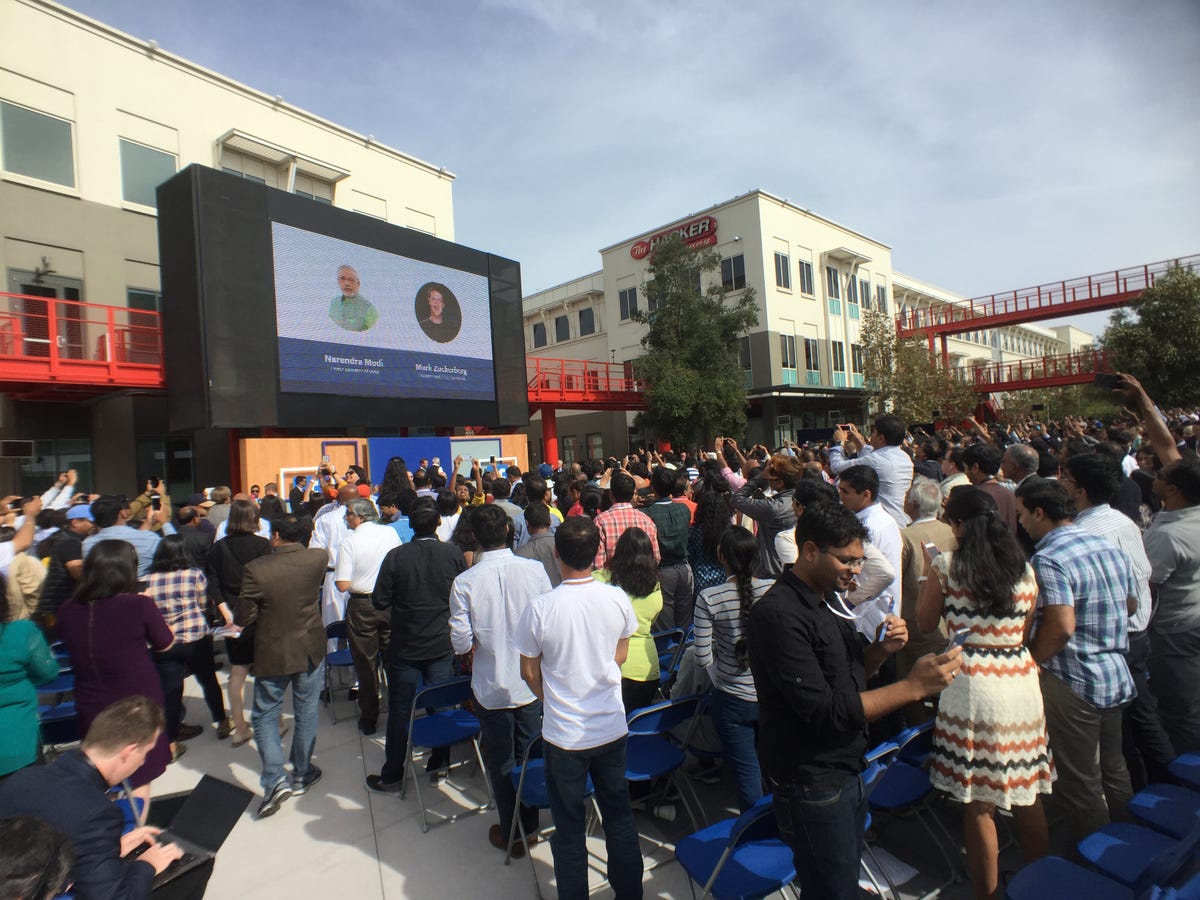 Enlarge Image
Enlarge ImageMENLO PARK, Calif. — The next step for social media: government.
That’s what Narendra Modi, India’s prime minister, said at an event held Sunday morning at Facebook’s headquarters here, discussing how he’s increasingly used social media to connect with both people in India and other governments. The result has helped bridge the divide between politicians and their constituents.
“We used to have elections every five years, but now we have them every five minutes,” he said, speaking through a translator.
Mark Zuckerberg, Facebook’s CEO, said he was impressed with Modi’s efforts. “It’s fitting that the leader of the world’s largest democracy is setting an example for all world leaders for how to connect with citizens online,” he said.
In a wide-ranging discussion touching on women’s rights, economics and technology, Modi discussed larger efforts to bolster India’s economy, particularly through the Internet. One key effort, he said, will be to link India’s 600,000 villages through fiber optic networks, which he believes are the 21st century highways.
Those efforts will also help to attract foreign investment, he said. “There are many companies who don’t even know where to invest their money, so I’m giving them the address: Here’s the place,” he said to applause.
Modi’s public conversation with Zuckerberg is one of the most high profile events he’s held in Silicon Valley during a trip that began earlier this week. The popular Indian prime minister has been meeting with the heads of the tech industry’s largest companies, including Google CEO Sundar Pichai and Apple CEO Tim Cook in addition to Zuckerberg, according to a report from The Wall Street Journal. Modi is using this trip to connect with the large Indian community here, as well as to stir up interest in upgrading his country’s technology infrastructure.
Modi is also expected to discuss plans to make it easier for investors to buy and sell stakes in Indian startups.
For Zuckerberg, Modi’s visit marks the first time he’s held a public town-hall style event at Facebook with a head of state since inviting President Barack Obama to a similar event in 2011.
Zuckerberg speaks
- Facebook sees a ‘dislike’ button in your future
- Facebook’s Zuckerberg muses on Net neutrality, defends Internet.org
- Facebook’s Zuckerberg talks terrorism, entrepreneurship
- Zuckerberg muses on ‘dislike’ button, the emotion study and pizza
- Zuckerberg muses on clothing, messaging apps and ‘hurtful’ movie portrayal
Modi is not the only head of state meeting with the tech industry this week. Earlier, China’s President Xi Jinping met with top tech executives at an event in Seattle, during which he discussed key issues such as cybercrime and foreign investment.
Analysts say these events mark a recognition among world leaders of the technology industry’s influence and power.
Zuckerberg’s event with Modi is further recognition of his rising profile on the world’s stage. The Facebook cofounder was at President Xi’s Seattle meeting, for example, and he sat at the head table with President Obama during a state dinner Friday. He then traveled to New York where he announced a partnership with the UN to offer Internet access to refugee camps.
Zuckerberg began his talk with Modi by talking about when he visited India early in Facebook’s history. He’d gone because the company had hit a rough patch and competitors were trying to buy it. Apple cofounder Steve Jobs told him to go to a temple in India to help reconnect with his vision for the company.
He spent a month there and said he saw how important communication and connections between people were. It “reinforced for me the importance of what we were doing,” Zuckerberg said.
Politics, women’s empowerment and expatriates
As part of the talk, Modi discussed the role of women in India’s government. He said that women have had success in the education and health sectors, but acknowledged that they need more representation in parliament.
“If we want to achieve our economic goals, then we cannot do that if we imprison 50 percent of our population in their homes,” he said. India has set rules for local government requiring that 50 percent of seats be reserved for women, he added, and he said women need to be brought into decision making in the national government as well. “Only then can the country move ahead,” he added.

 Enlarge Image
Enlarge ImageIan Sherr/CNET
Those comments impressed Nallhieli Mateos, 26, who attended the event as a subcontractor from Facebook. “I like where he’s headed with India’s government,” she said.
What struck Srikanth Kallakuri most was Modi’s comments about his mother, who would work in neighbors’ houses cleaning dishes, filling water and doing hard chores to help pay for his upbringing. Kallakuri, now a doctoral student in computer science at Carnegie Mellon University, said his mother had to work 15 hours a day as a teacher. “I was remembering my mother when Modi was talking about his mother,” he said.
He said he’s unsure if he’ll go back to India when he’s done with his schooling, but hearing from Modi helped him see there are more opportunities opening up there.




